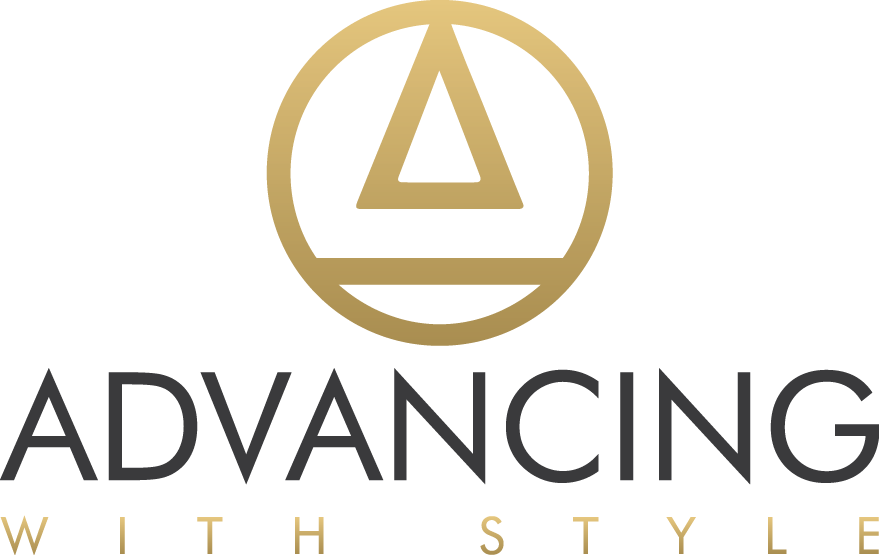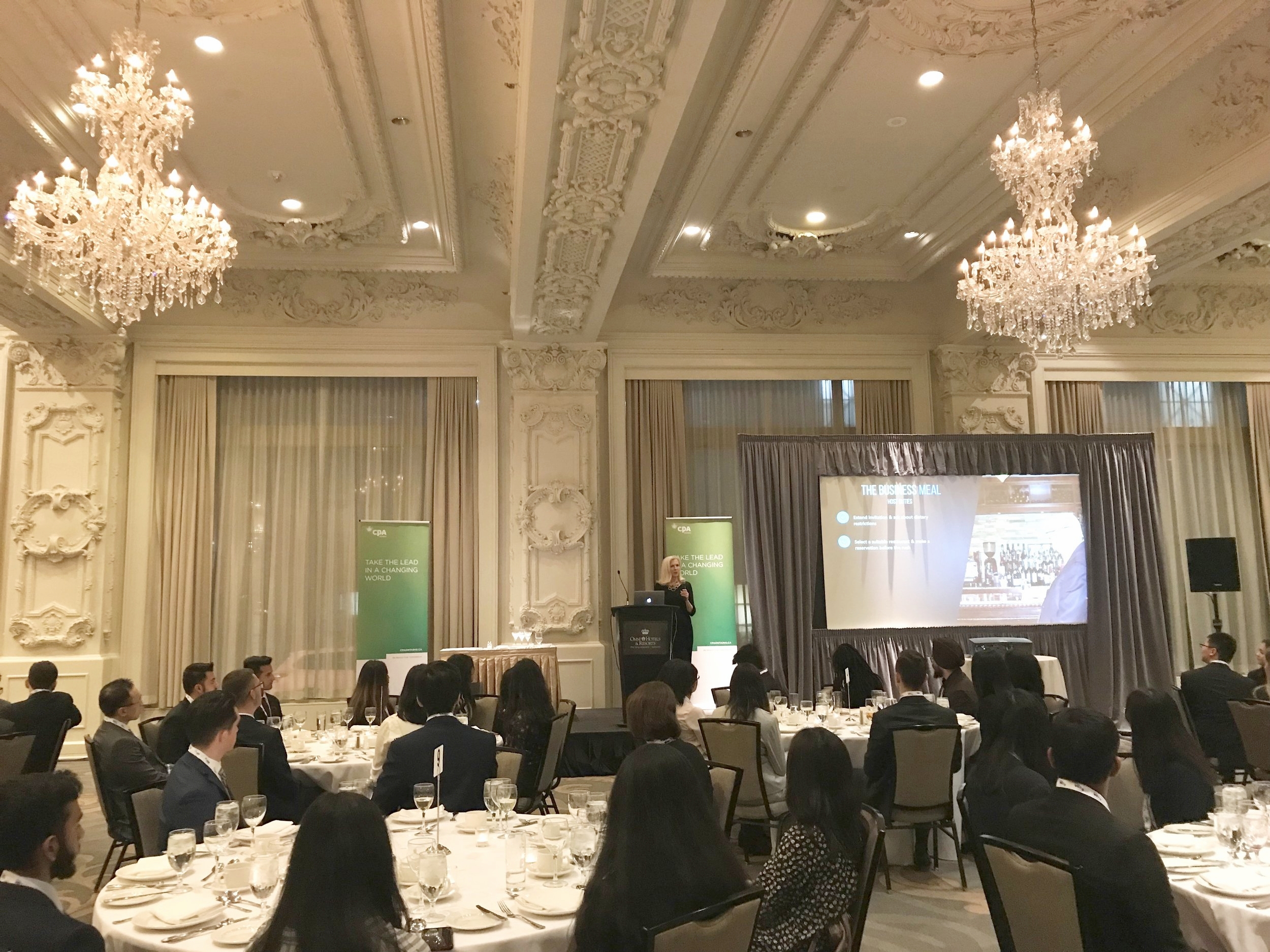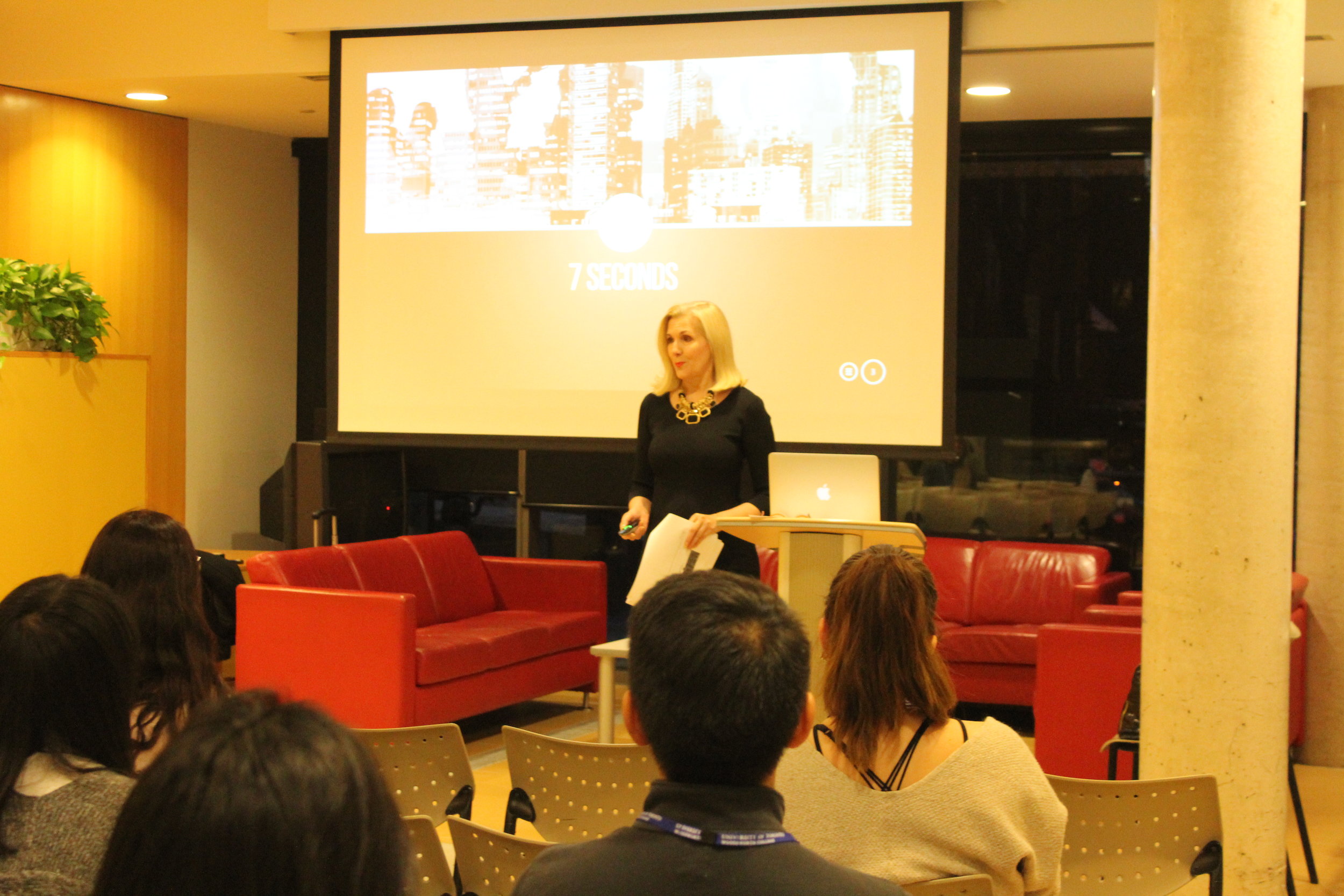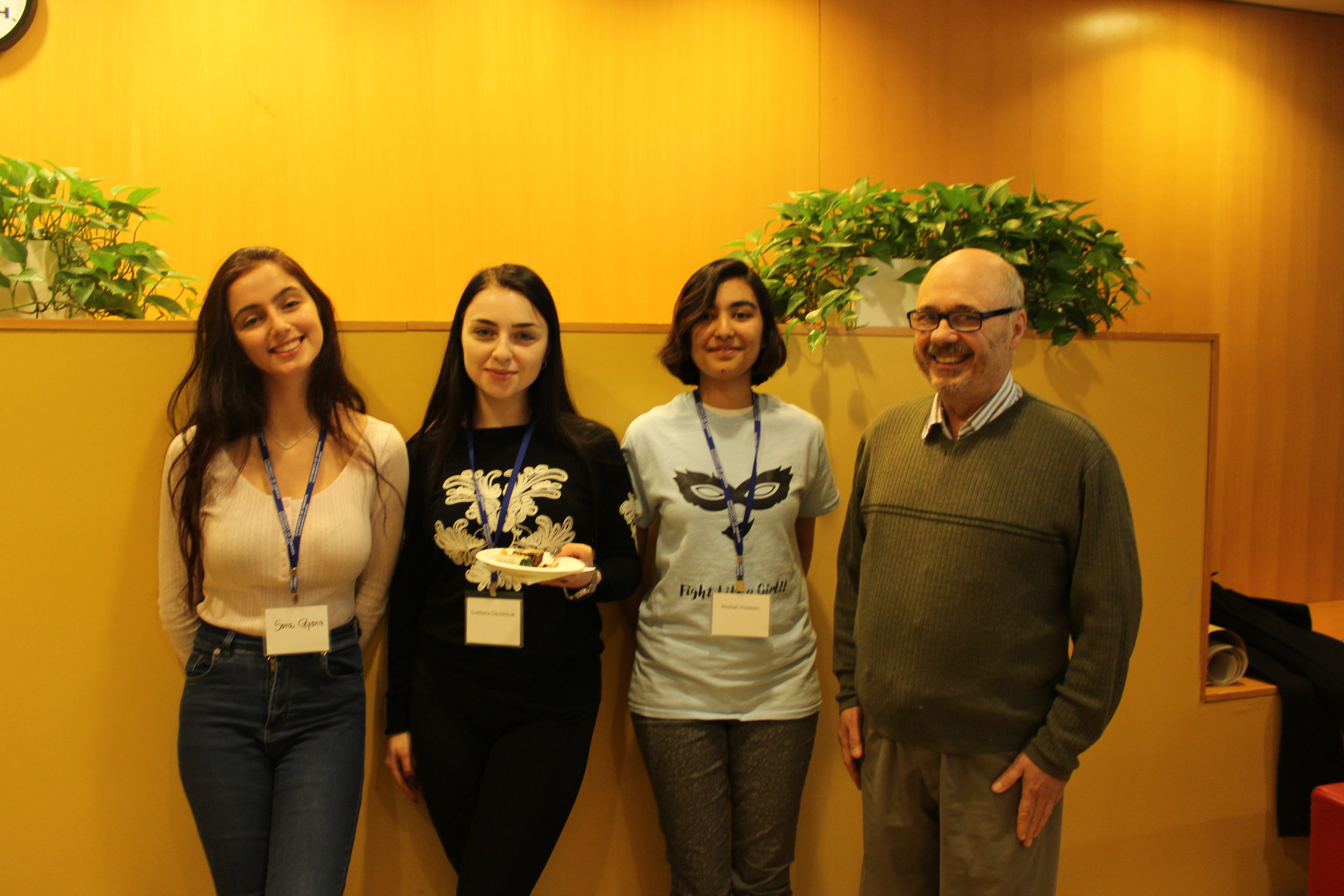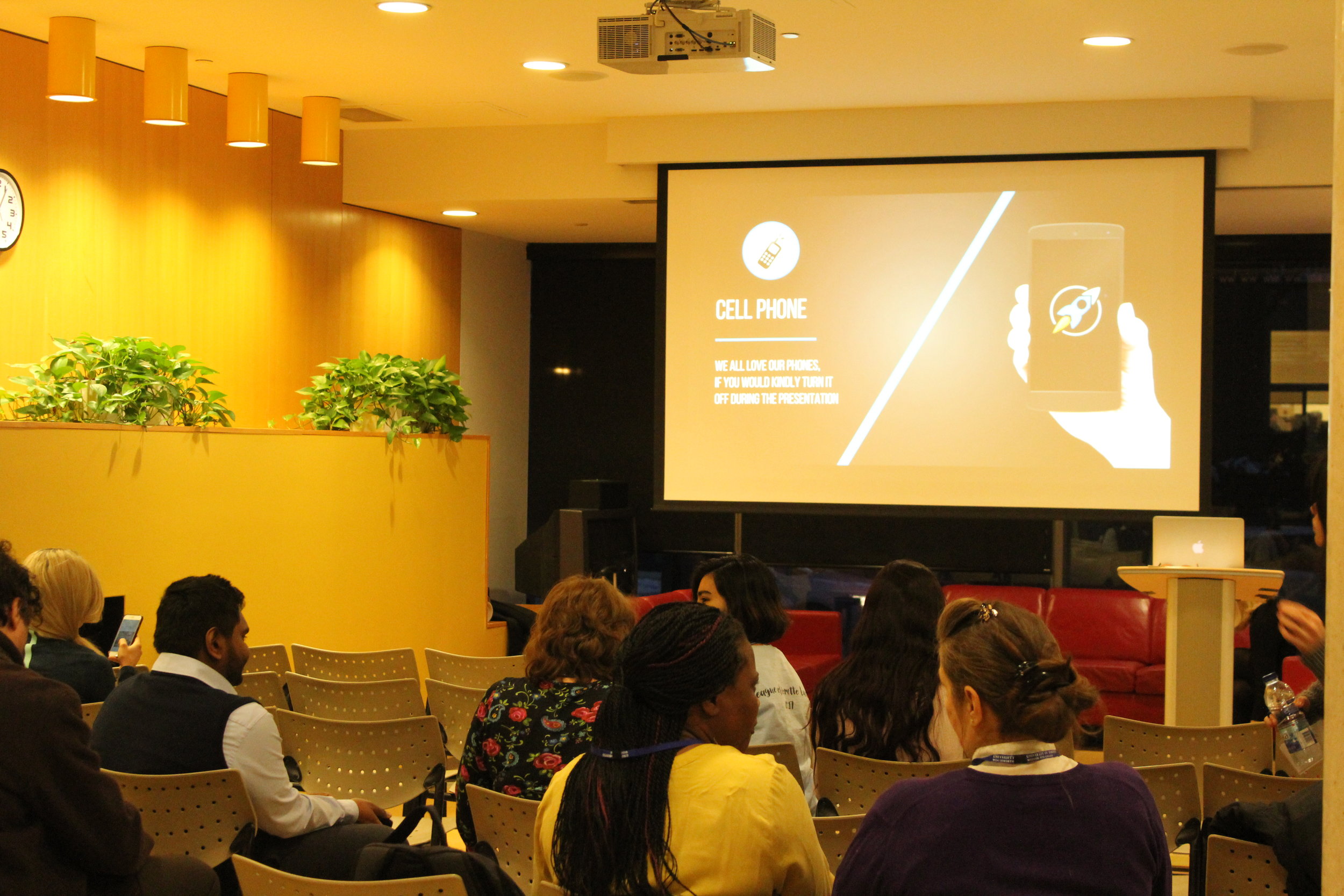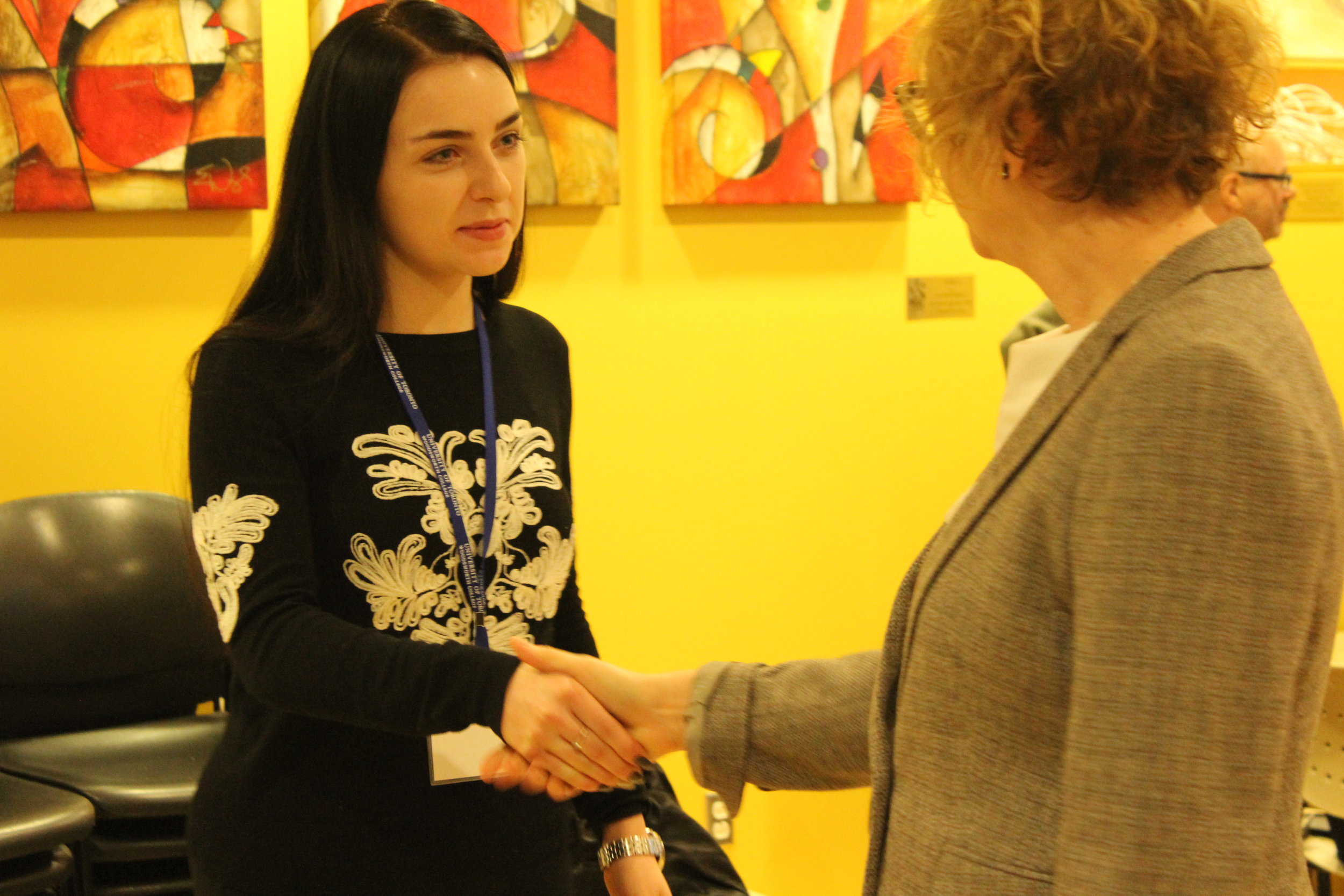I had the privilege to present to a great group of students at Seneca College on Business Networking - How To Turn Contacts into Connections. Over the years I have developed a simple, fool proof way to build a strong network. Networking is a soft skill essential to business success.
Soft Skills Training for Inspiring CPA's
I recently had the honor of speaking to a dynamic group of aspiring CPA’s on the importance of developing the essential soft skills that are needed for career success. We started the evening with a crash course on business networking. Networking is important because 80% of jobs are found through networking.
During dinner I covered business dining etiquette and how to successfully host clients. There were many questions on business etiquette as the evening progressed. After the dinner they had the opportunity to network with each other and the CPA’s that were at the dinner. A fun filled and informative evening for all!
"Brand Yourself Professional" Seminar for Woodsworth College
This past week I had the opportunity to talk to students, alumni and mentors from Woodsworth College on how to brand yourself as a professional in the workplace. With the job market being very competitive it is so important to be viewed as a professional in the workplace. During the seminar we talked about the importance of first impressions and appropriate attire, the art of networking, interpersonal communication skills and how to start mastering your own body language to appear more confident and trustworthy. Then they had the opportunity to practice their newly learned skills and mingle.
It was a pleasure meeting and talking to all of you. A special thank you to Stephanie and Gabbi who made this event a success.
Passion and Perserverence. Do you have the "grit" that it takes to succeed?
Angela Lee Duckworth talks about what it takes to succeed. It's not all about how intelligent you are or how many degrees, it's a mindset that she calls grit.
Talk To Me In Person
How Much Time Do You Spend Looking Down?
Technology is fabulous and a big part of our lives. But it shouldn't be our major form of communication. We tend to forget that we are human beings and need to be in touch with each other in person. Learn to develop your interpersonal communication skills. Every form of communication, whether it be text messaging, email, phone or in person has its pros and cons. We have to make a decision as to which form is the best for the situation.
Unfortunately, many people have forgotten how to communicate one-on-one. They are lacking the social skills that are necessary to succeed in the business world. They go out to a social function and spend the whole time texting and looking down rather than meeting new people and conversing.
So the next time you are invited out, put the phone away and actually talk to people. You just might find that you like it.
How to Work a Room Infographic
Quick Resume Tips to Help You Land a Dream Job
Did you know that you're likely to spend around 90,000 hours at work during your lifetime? That's a huge amount of time; there's no doubt about it. Why would you waste it working in a job that you don't feel passionate about? Sure, the economy is tight and job markets are full of qualified candidates, but do you see how much of your life is at stake here. Many professionals are afraid of putting themselves out there, choosing to continue working jobs that don't give them any satisfaction.
On average, every resume sent for a position has to compete with over 250 others. Recruiters spend only 6 seconds scanning each document to check whether it's worth reading. These are serious challenges, but they shouldn't deter you from getting closer to your dream job.
Learning how to make a resume that grabs recruiters' attention and presents your profile in the best light, can seriously boost your chance at landing a fantastic position.
It doesn't take a lot of time to revamp a resume. Below you'll find a selection of clever, 5-minute resume tricks to help you craft a resume that will jumpstart your career in any industry.
Here's what you can do right now to improve your resume instantly:
● Organize it with scanability in mind.
● Choose a font that boosts readability.
● Prioritize information.
● Write a compelling introduction full of strategic keywords to grab recruiters' attention.
● Include numbers, statistics, and details that paint a better picture of your expertise.
● Have someone proofread your resume to search for mistakes, or use Grammarly.
Remember that your resume and all online profiles should present a similar professional narrative. Craft a story about someone who knows their strengths and is ready to work hard towards achieving their goals.
You’ll inevitably become that person in recruiters’ eyes.
These quick tricks will help you to create a resume that engages recruiters and boosts your chances at landing a dream job.
Have a look at the infographic to get even more quick tips for a serious resume boost.
Tips for Mastering a Skype Interview
A Skype Interview can be the first impression an employer has of the candidate. Just the way people form 10 impressions about you within seconds of meeting you in person, the same impressions will be made via Skype. Here's some tips on making a powerful impression in a Skype interview.
PREPARATION:
You can't wing an interview, preparation and rehearsing is critical. The first thing is to conduct research on the company. Read the latest company and industry news, and check the profiles of key people in the organization including your interviewer. Having little or no knowledge of the company is the most common mistake job seekers make during the interview. Anticipate possible questions and rehearse answers to common interview questions. Prepare questions for the interviewer.
Decide what you are going to wear for the interview. In a recent survey 65% of bosses indicated that clothing could be a deciding factor between two almost-identical candidates. Men should wear a suit, crisp traditional shirt and tie. Pay attention to the shirt collar collar, making sure it fits correctly and is not too tight or loose. Select a quality tie that complements the suit and shirt, avoiding anything too flashy. Your tie should hang straight and the knot should be up against the collar. Pay attention to your grooming, making sure your hair is neat, facial hair is trimmed, and nails are clean.
For women select a suit jacket in a more traditional colour with a top or blouse. No low cut tops that show cleavage. This is not the time to be ultra fashionable or avant grade. The clothing you select should complement you but not distract the interviewer. Makeup and nails should be tasteful avoiding extremes. Take the time to style your hair so that you look professional. Accessories should be kept to a minimum.
EQUIPMENT CHECK
Download and install Skype if you don't already have it. Test it out and become familiar using it. Select a professional sounding user name. Select a quiet room to use the day of the interview. Set it up so that you have a clean uncluttered background. Set up your computer in an area so that you have a plug in. Prop your computer so that it is at eye level, and set up your lighting. Experiment with the lighting until you are satisfied.
PRACTISE
Do a few dress rehearsals with friends. Pay attention to how you look and how you sound. If you are using a headset make sure it's working correctly. Ask for feedback from friends as to how you could improve. Pay attention to your body language. Remember to smile, look directly into the camera, sit up with good posture, avoid nervous gestures such as touching your face or playing with your hair and avoid fidgeting.
DAY OF THE INTERVIEW
Check you equipment to ensure that everything is working correctly. Remind everyone of the time of the interview and ask them to be quiet. Turn off additional phones and put pets in other rooms. Be online and prepared 15 minutes before the interview. Have a pen and paper handy, your notes and a glass of water. Do some "power posing" to lower your stress levels.
DURING THE INTERVIEW
Greet the interviewer with a genuine smile. Pay attention to your body language. Be enthusiastic when talking and show humor, warmth and interest. One of the common mistakes in a job interview is not asking for the job. At the end of the interview thank the interviewer and send a thank you by email.
Get our checklist on How to Master a Skype Interview.
Are you a typical millennial?
Managing the Job Interview Over a Meal
As if a job interview isn't difficult enough, but interviewing over a meal requires another skill set which is the knowledge of dining etiquette. Many companies conduct the second or third interview over a meal. You may be the only one present or you may have a group of candidates who are all competing for the same job as yourself. The reason for the job interview over a meal is to get to know you better, to see if you have excellent table manners, can you carry on a conversation, would you have the ability and finesse to entertain clients.
While you can prepare for an interview by memorizing and practising the likely questions, an interview over a meal is more spontaneous and less predictable. For example, Charles Schwab CEO Walt Bettinger takes potential employees to breakfast and gets the serving staff to intentionally mess up the order. He told the New York Times, "This is a test to see how they deal with adversity. Are they upset, are they frustrated, or are they understanding? Life is like that, and business is like that," he explained. How would you handle this situation if it happened to you? Be prepared for the unexpected, as some interviewers purposely do things to see how you react and handle the situation. Don't let your guard down, as this is not social, it's business.
So how can you prepare yourself. Here are my suggestions;
Do your research
Find out who is interviewing you and gather information online about the person, their career path, and special interests. Think of 3-5 questions that you can ask about the company, the interviewers background and even their special interests.
Check out the restaurant
Find out the location of the restaurant and know how to get there and where to park. Allow ample time, as you never want to be late or hurried. Arrive 15 minutes early. Look at the menu online and select items that you would like to order so that you look decisive the day of the interview. If you have dietary restrictions contact the restaurant in advance to see what items on the menu would be suitable.
Select your attire
First impressions last, so make sure yours is stellar. Decide what you are wearing and lay out all of the clothing items and then try on the entire outfit and take a picture. Do you look professional and polished? Do your clothes fit you correctly - pay attention to the sleeve length, correct trouser length, skirts that are too short when sitting down and collars that are too loose or tight. Ensure that your shoes are polished and in good shape. Avoid distractors such as jewellery that jangles, excessive piercings and tattoos, unnatural hair colouring, seductive clothing, stains, lint and pet hair.
Pay attention to your personal grooming
Interviewers notice poor hygiene such as greasy hair. Take the time to style your hair and use products to keep it in place. Nails should be filed and clean. Women should stay away from extreme nail colours. If you wear a cologne or perfume keep it light and discreet.
Select small talk topics
Go to the interview with 3-5 small talk topics that you can use to start a conversation. Look in the paper or online for interesting current topics. Avoid taboo topics such as politics, religion, and other highly controversial topics. Make sure you converse with all people at the table, not just your interviewer. If you have a difficult time making small talk take a course in communicating or networking.
Turn off your cell phone
Never use your cell phone at anytime during your interview meal. Turn it off as you are walking up to the restaurant and leave it turned off. Don't try to sneak a peek or text under the table as it implies that you are not interested in the interviewer or the job.
Learn how to hold your dining utensils
As simple as it may sound, most people do not know how to eat correctly. They have not acquired the basic skills such as how to correctly hold their knife and fork and where to place them when resting or finished eating.
Practise dining etiquette
Dining etiquette is a skill set. Once acquired you will have it for life. Learn and practise this skill set well in advance of an interview. Over time, table manners become second nature and it's one less thing you have to worry about whether you are being interviewed or out with colleagues and clients. During a interview over a meal you will be observed as to how sophisticated and confident you are during the meal. Some interviewers watch for slip ups such as salting food before tasting. You don't want to eliminated for a job due to a simple dining faux pas. If you need to brush up on your dining skills take an online dining etiquette course or have a private lesson.
No alcohol
Even if offered, the best policy is to refrain from alcohol during the interview meal.
Order food that is easy to eat
Select food that is easy to eat and not messy. You don't want to order the loaded hamburger that drips all over or the spareribs that require you to eat with your fingers. Beware, some interviewers have a preset menu and intentionally order food items that are difficult to manoeuvre.
Never be rude to the wait staff
Be polite to everyone during the meal and that includes the waitstaff. People notice if you say please and thank you and your attitude towards others.
No doggy bags
The interviewer pays
The person who invites is the person who pays. Do not pick up the bill or offer to pay even if it is placed next to you at the end of the meal
Send a thank you note
Say thank you to your host when the meal has ended and send a thank you by mail or email immediately after the meal.
What You Should Know When Interviewing For A Job
Here is an excellent video to review when going for a job interview.
